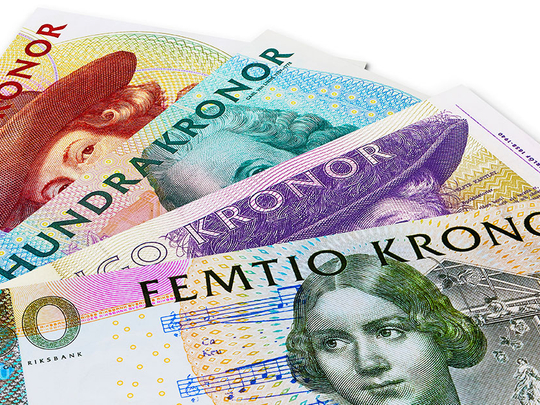
London: Sweden’s crown fell to a six-year low and its stock market hit a record high on Thursday after the central bank in Stockholm surprised investors by launching a stimulus programme and cutting its main interest rate below zero.
The Riksbank lowered its key repo rate by 10 basis points to -0.10 per cent and said it would buy 10 billion crowns of government bonds a month. It said it was prepared to do more at short notice to safeguard its inflation target of 2 per cent.
The majority of analysts in a Reuters poll had forecast no policy change this month. Analysts were divided on whether the Riksbank would adopt further unconventional policy measures.
In Europe’s battle against deflation, the European Central Bank announced a 1 trillion euro quantitative easing programme last month and the Swiss and Danish central banks have also cut rates into negative territory.
Thursday’s parallel move by the Riksbank hit the Swedish currency.
The crown fell nearly 2 per cent against the dollar to 8.5512 crowns per dollar, its lowest since April 2009. Against the euro, it skidded 1.7 per cent to a two-month low of 9.6894 crowns.
Sweden’s main OMXS30 equity index hit a record high of 1,623.88. Yields on Sweden’s 10-year benchmark government bond fell 7.5 basis points to 0.56 per cent.
“Clearly they’ve been more aggressive than expected,” said Adam Cole, global head of FX strategy at RBC, London. “It leaves both the threat of more QE and the threat of more rate cuts open. So it’s hard to be constructive on the currency.” Balance sheet expansion through asset purchases, or quantitative easing, usually weakens a currency as it increases its supply, though the 10 billion crowns (67 million euros) a month the Riksbank plans to buy is dwarfed by the ECB’s 60- billion-euro programme.
As such, the crown could recover ground in coming weeks especially if Eurozone risks surrounding Greece take a turn for the worse. That could complicate the Riksbank’s fight against deflation, analysts said.
“Pushing the crown lower against the euro from current levels, however, would require far more aggressive balance sheet expansion,” said Geoffrey Yu, currency strategist at UBS.
“In light of ongoing Eurozone risks surrounding Greece, long dollar/short Swedish crown is the preferred vehicle to reflect the Riksbank’s new trajectory.”












